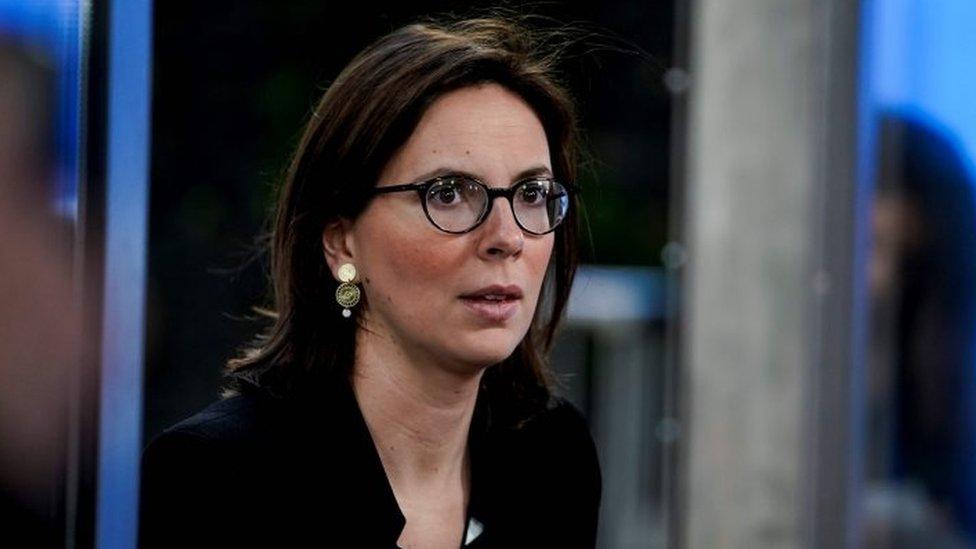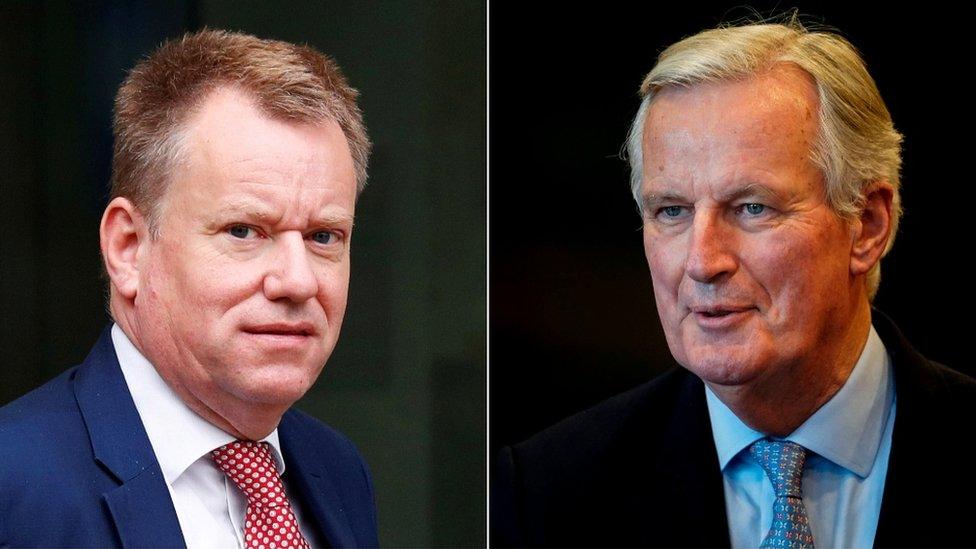Post-Brexit talks: France warns UK against 'artificial deadlines'
- Published
- comments

Amelie de Montchalin: Trust between the two sides is vital
The EU will not be pressurised by "artificial deadlines" in its post-Brexit trade talks with the UK, France's Europe minister has warned.
Amelie de Montchalin said the EU would not sign just "any" deal by the end of the year, saying "substance was much more important than deadlines".
The UK has said it could walk away from the talks in June unless there was the "broad outline" of an agreement.
The process, to be conducted in English, will begin on Monday.
Details of what will be discussed and when, external have been published, with topics to be covered in the first round of negotiations including trade in goods and services, transport, energy, fisheries and "fair and open competition" in future dealings.
Further rounds of negotiations will take place every two to three weeks, alternating between London and Brussels.
The session in June, in which both sides will "take stock" of progress made at that point, is likely to prove crucial.
The UK has ruled out extending the process beyond the end of the year, when the post-Brexit transition period will end.


The UK and EU have agreed a schedule for negotiations based on 11 simultaneous streams, including one on the controversial subject of "a level playing field for fair and open competition".
Eighteen days of talks have been scheduled until mid-May but the UK has not agreed to negotiations on defence or foreign policy, which the EU side wanted.
The document says the working groups do not necessarily reflect the structure of the final agreement and the arrangements could change. The two sides can also speak to each other outside the formal rounds.
The negotiations in Brussels will take place in a conference centre, not at the headquarters of the European Commission, although the "plenary sessions" and meetings between the chief negotiators will be held there.

Friday's document, which sets out the terms of reference for the talks, says June's "high-level" meeting between chief negotiators David Frost and Michel Barnier will aim to "agree actions to move forward in negotiations on the future relationship".
Speaking at the Chatham House think tank in London, Ms de Montchalin said the EU would "not accept time pressure" and was "not ready to sign any kind of a deal on December 31 at 11pm".
"We cannot let our level of ambition be affected by what I would call artificial deadlines," she said.

David Frost (l) and Michel Barnier (r) will lead the negotiating teams
"If the UK decides to shorten the negotiating period, it will be the UK's responsibility.
"It will not be our choice on the European side, and that choice will have consequences in terms of the breadth and depth of the relationship we can build... for us substance is much, much more important than deadlines."
The UK officially left the EU at the end of January, but is continuing to abide by many EU rules while talks on a permanent trading relationship take place.
The UK and the EU have both set out their priorities for the talks, with flash points including the UK's wish to diverge from EU employment and environmental standards in future, its ruling out of any role for the European Court of Justice and the level of EU access to UK fishing waters.
Michael Gove: UK is not seeking EU rules alignment
The UK has insisted a "comprehensive" free trade agreement, modelled on existing EU agreements with the likes of Canada and Japan, is possible within 10 months and it will decide by this summer whether this is achievable.
If the UK decides such a deal is not in prospect, the government has said it will move to World Trade Organization rules from the start of 2021, under an arrangement similar to the one that the EU has with Australia.
The EU's 46-page negotiating document, external, published on Monday, said any trade agreement "should uphold common high standards, and corresponding high standards over time with Union standards as a reference point".
Ms de Montchalin said trust between the two sides was vital to a successful outcome and the EU needed to know that the existing withdrawal agreement and its guarantees on citizens rights and the Northern Irish border would be stuck to.

